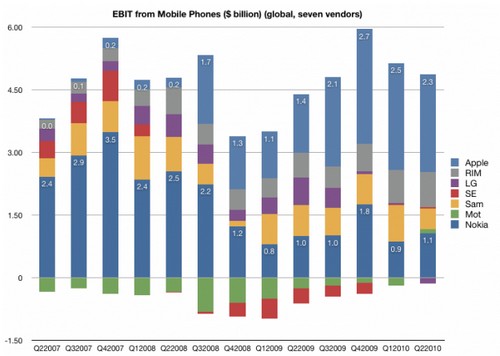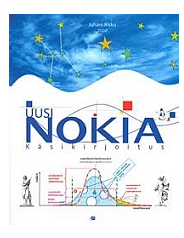
Dediu’s analysis is a good one: winning the commodity smartphone battle really isn’t a battle worth winning. It’s another example of the delusion that turnover is as important as profit.
One of the oldest mottos at Vulture Central is Show Us The Money. There’s one even better, I think, which is Show Us The Profits. Are there any? If there are, where are they going? At a stroke, this cuts through huge amounts of hype and puts entire industries (and, for good measure, almost anything WiReD magazine has ever endorsed) in a much clearer perspective. So have a gander at the following analysis of the mobile phone business – it’s quite startling.
Asymco is a one-man analyst company operated by Horace Dediu, a former Nokia manager in Helsinki, erudite and informative with a good eye for history. Earlier this week he looked at the profits of the largest seven manufacturers, responsible for 80 per cent of the phones sold, over the past three years. The trend indicated last year is now quite clear, with two North American companies capturing the lion’s share of the profits. In Q2 2007, Nokia pocketed 63 per cent of profits; Apple and RIM just seven per cent between them. Wind forward three years, and Apple and RIM snag 65 per cent of the profits, largely at the expense of Nokia, but helped by the collapse of Sony Ericsson and Motorola, who are a tiny shadow of their former selves.
There’s a conclusion to be drawn for Google and the Android licensees, thinks Asymco. None of the three leaders are likely to abandon their in-house platforms for Android, it’s either inferior (to iOS) or (as with BlackBerry OS, Symbian or Meego) switching simply isn’t worth it. So Android is left to target the very manufacturers who have been squeezed. And that in turn leaves them with some tricky choices to make. Android is becoming a commodity platform, so they need to differentiate themselves from the rest of the Android rabble: we’ve seen Sony Ericsson, HTC and Motorola invest heavily in their own UIs. But because Android is a commodity platform, this investment isn’t worth it.
Read more
 Exclusive Ofcom will encourage ISPs to be transparent about traffic management, but won’t ask them to detail the information in a standard format, according to meeting notes seen by The Register.
Exclusive Ofcom will encourage ISPs to be transparent about traffic management, but won’t ask them to detail the information in a standard format, according to meeting notes seen by The Register. 





